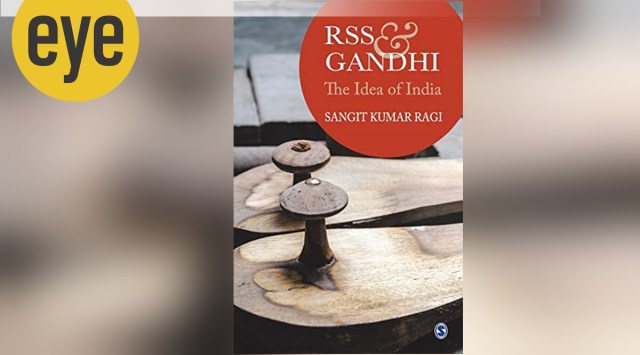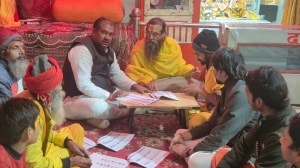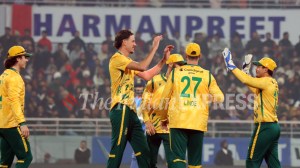Sangit Kumar Ragi’s ‘RSS and Gandhi: The Idea of India’ highlights the RSS’s uncomfortable relationship with Mahatma Gandhi
Despite its ideological bias, the book tries to provide an alternate perspective to understand Gandhi other than from the secular prism
 RSS and Gandhi: The Idea of India; Sangit Kumar Ragi; Sage; 352 pages; ₹1395 (Photo: Amazon.in)
RSS and Gandhi: The Idea of India; Sangit Kumar Ragi; Sage; 352 pages; ₹1395 (Photo: Amazon.in)No letter in Indian history signifies more aptly the enigmatic relationship of the RSS with India and her greatest son, Mahatma Gandhi, than the one written by Sardar Patel to the second chief of the RSS on September, 11, 1948. Patel was then the home minister of the country and he indirectly blamed the RSS for the assassination of the father of the nation. He writes, “… All the speeches were full of communal poison. It was not necessary to spread poison and enthuse the Hindus and organise for their protection. As a result of the poison, the country had to suffer the sacrifice of the valuable life of Gandhiji… RSS men expressed joy and distributed sweets after Gandhiji’s death.”
Buy Now | Our best subscription plan now has a special price
The RSS has always denied its role in Gandhi’s murder but it is an un-erased fact of history that Nathuram Godse was a member of the RSS. What is debatable is if at the time of this ghastly act he was still associated with the RSS. Patel in the same letter, blamed the RSS for being “revengeful” towards Muslims. There is no denying the fact that the RSS during the freedom struggle was no fan of Mahatma Gandhi. It blamed Gandhi for Muslim appeasement and believed that he was bending too much towards Jinnah to accommodate his demands which in their opinion proved to be fatal for the nation, led to the blood bath and massacre of Hindus and the Partition.
The truth is that RSS till date has not forgiven Gandhi. Gandhi and his non-violence, in their thought process, underlines the civilisational weakness and reason for the subjugation of Bharat for centuries. But they also realised that, without Gandhi, RSS would not be acceptable to the larger mass. Hesitatingly in the public domain for the sake of socio-political legitimacy, they acknowledge Gandhi’s contribution.
RSS and Gandhi: The Idea of India, written by an RSS activist and professor of political science in Delhi University, Sangit Kumar Ragi, is another attempt to acquire that legitimacy. But this book goes beyond that — it tries to rob Gandhi from Congress and appropriate his grand legacy totally. Ironically, like Muhammad Ali Jinnah, this book, too, tries to prove that Gandhi was a Hindu leader, and that Gandhi and the RSS are not antithetical. Rather, in many ways, both are similar and Hindu to the core.
Ragi writes, “Both Gandhi and RSS did not give a clarion call to the Hindus to go back to Vedas alone, and forget temples and their gods and other scriptures as Dayanand Saraswati did. On the contrary, both used all the Hindu symbols and scriptures to propagate the importance of Hinduism on the one hand and to arouse the Hindu consciousness on the other hand. Gandhi argued that if this consciousness is not invoked, Hindus would cease to be Hindus. RSS exhorted that if Hindu consciousness and Hindu consolidation is not done, India and its civilisational and cultural ethos which make it unique in the world will perish forever, Both are unapologetic about Hinduism and its practices.”
But Gandhi was not a fanatic Hindu. His definition of Hindu and Hinduism is different from the RSS. Gandhi asks in Young India, “Who is Hindu.” And he himself replies, “A man is a Hindu who is in search for spiritual truth through non-violence, even if he does not believe in God.” Unlike RSS, Gandhi’s Ram and Krishna are no historical figures. Rather, he finds them to be embodiments of ethical values, divine and liberating. For Gandhi, Hinduism is a spiritual journey, it is not situated vis a vis Islam. Gandhi’s Hindu does not quarrel with Muslims and, for him, Indian history is not a holy war between Hinduism and Islam and Muslims rulers are no demons. The RSS finds this problematic and Ragi does pinpoint it in the book.
 The book should be read by those who want to have a philosophical understanding of the RSS and its uncomfortable relationship with Gandhi. (Photo: Amazon.in)
The book should be read by those who want to have a philosophical understanding of the RSS and its uncomfortable relationship with Gandhi. (Photo: Amazon.in)
He writes, “Gandhi looked for ethical and spiritual response to political Islam whereas the RSS and its likes called for political response to it.” For the RSS, Muslims are the “others” who have not adapted to Indian culture and traditions. Ragi writes that RSS believes, “Islam does not go with the integrative assimilatory soul of Hinduism and therefore constitute big threat to the Indian civilisation. While Gandhi looked towards persuasion of the Muslims in order to resolve the problem, the RSS saw the answer in Hindu unity and Hindu consolidation.”
Unlike the left movement, the RSS, despite being a big organisation and hegemonic ideology in the present context, suffers from the severe dearth of scholarship and intellectualism; most of the scholarly work about the Sangh is done by those who don’t belong to the RSS. Ragi seems to be the exception. His intellectual rigour and industriousness is visible. His research is exhaustive. Despite the ideological bias, he tries to provide an alternate perspective, opens a new window to understand Gandhi other than from the secular prism.
Unlike the left-liberal narrative, in Gandhi he discovers a man, who like the RSS, believes that “India as nation was a historical fact … and it did not emerge in modern times”; for whom “cow protection was central to Hinduism”; who opposed conversion and supported ghar vapsi programme; who did not condemn the varna system, despite being critical of caste and untouchability.
Ragi very proudly proclaims that “protection of Hinduism and Hindu society was one of the greatest concerns of Gandhi which he did not hide” but he exposes his skeletons when he writes that “Gandhi never criticised RSS”. Gandhi did call RSS “communal organisation” in his column in Harijan on August 9, 1942. According to his secretary Pyarelal, when one of Gandhi’s supporters praised RSS’s discipline and hard work, “Gandhi quipped … don’t forget so had Hitler’s Nazis and the Fascists under Mussolini.”
In his zest to defend the RSS, Ragi writes that the “RSS does not have hatred towards other religions”, but then such omissions can be overlooked considering the ideological framework he swims in. The book should be read by those who want to have a philosophical understanding of the RSS and its uncomfortable relationship with Gandhi.
The writer, a former journalist, was an Aam Aadmi Party candidate from Delhi in Lok Sabha elections. He is the editor of SatyaHindi and author of Hindurashtra
- 01
- 02
- 03
- 04
- 05































